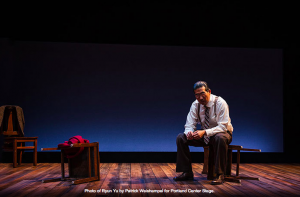Cue the opening scene of Georgetown alumnus Mary Kathryn Nagle’s Sovereignty: A drunken white man wearing a “Make America Great Again” shirt stumbles into a Casino and hurls racial slurs at the Native police officer before punching him in the face. The police officer, Watie (Jake Hart), does not have criminal jurisdiction to arrest him, so the man walks away freely while Watie cleans up his bloodied face.
The play tells the story of how via the Supreme Court Case Oliphant v. Suquamish Indian Tribe (1978), the Court overturned Judge Marshall’s ruling in Worcester v. Georgia (1832), stripping Tribal Nations of their right to arrest and punish non-Natives that commit crimes on Tribal lands. In 2013, Congress reauthorized the Violence Against Women Act (VAWA) with a provision that allows Tribal courts to prosecute non-Native men who abuse Native women on reservations—returning just a fraction of the sovereignty rescinded by Oliphant. VAWA is to be reauthorized in 2018.
This complex history of injustice comes to life in Sovereignty, which will be playing at the Arena Stage through Feb. 18. Nagle will be coming to Georgetown’s campus to discuss the show at 5 PM on Feb. 7 at Gonda Theater.
In a story about fighting the legal system, it only makes sense that the lead woman is a strong spoken and fierce lawyer. Sarah Ridge Polson (Kyle Garcia), Watie’s sister, is the star of the show. She clearly reflects attributes of Nagle herself, in that she is a well-educated and Cherokee lawyer activist as well as a proud descendant of John Ridge, one of the historic men who fought for the Worcester v. Georgia victory. Sarah has returned from her travels and studies, young, fierce beyond measure, and determined to fight the idea that her Cherokee sovereign nation does not have criminal jurisdiction to protect its citizens. The play artfully weaves together the story of Sarah’s modern-day fight and the actions taken by her ancestors during the era of Andrew Jackson’s administration. Amidst the powerful political dialogue, the intricate interplay of past and present, and striking symbolism in character relationships, the question of state sovereignty becomes overwhelmingly louder as the historical and contemporary worlds collide.
Nagle’s artful dialogue tells two stories at once: the story of Sarah Ridge Polson (Kyla Garcia) in 2018 and that of her great-grandfather, John Ridge (Kalani Queypo) in the 1830s. Sometimes the characters from the present will exit the stage as the characters from the past enter and vice versa; but, increasingly as the show goes on, the characters from one era will freeze in place as dim light washes over them, and the spotlight turns to the other half the stage where the other storyline is taking place: a very literal juxtaposition of past and present.
The stage is a bath of milky white—white walls, white floor, white centerpiece. While the occasional couch or desk is carried on or off stage between scenes, the set does not change very noticeably throughout the show. Lighting takes on the primary role in setting the mood, whether it is the purples of the casino, the black of the night, or the Cherokee nation seal projected on stage, illuminated by faint oranges and reds. Similarly, there are few, if no, costume changes, so each character is wearing the same outfit for the play’s duration.
This minimalist approach ensures that the audience’s attention is entirely focused on the heavy dialogue that is subtly enhanced by the light scheme, so as not to distract from any word that is spoken. The words in Sovereignty are everything, and the actors have memorized lengthy lines that are overflowing with legal jargon, activist messages, historical facts, and hidden symbolism. The audience is both thrilled by the dramatic script and educated on key issues that are not always at the forefront of American politics or history lessons.
With the exceptions of Garcia and Queypo, each of the nine cast members plays one character in the past and one in the present. Each pairing is symbolic, though arguably the most important pair of roles are played by Joseph Carlson who acts as Sarah’s fiancé, Ben, in the present, and as Andrew Jackson in the past. Although Ben loves Sarah, he is uninterested in Sarah’s culture or history, teasing her for caring so much about Oliphant, asking her to put her VAWA case down to pick out wedding cakes, and even complaining about finding a bathroom when Sarah brings him to John Ridge’s grave. Their romance is ultimately unconvincing, but as their relationship ascends towards domestic violence an important parallel is made. Sarah is John Ridge standing up for Cherokee Nation; Ben is Andrew Jackson, refusing to take Native issues seriously. Sarah is Cherokee Nation; Ben is an America that won’t give it the respect it deserves.
Not only does Sovereignty unravel the history of the federal government and Tribal leaders, but it also conveys the relationship between two important Cherokee families: the Ridges and the Rosses. John Ridge, Major Ridge (Andrew Roa), and John Ross (Jake Waid) were united in fighting for their right to their sovereignty in a time when Georgians were moving onto the land without question and American soldiers were abusing Natives and. Despite their victory in Worcester v. Georgia, the Cherokee were forced to face the mounting pressure to move West and the fact that President Jackson did not intend to enforce the Court’s decision, creating a rift between the Ridges and the Rosses that persists today. One of the many enticing past/present parallels of the show is the relationship between Sarah and her boss, Jim Ross (Jake Waid), both being direct descendants of Ridge and Ross. As the story of their ancestors is played out in anger and sadness, Sarah and Jim’s fondness for each other turns past hatred into present forgiveness—all of this happening on the same stage at the same time.
Sovereignty is a story of just that. It is about telling a chapter of American history and politics that is sometimes not at the forefront of conversation. It is about racial, political, and cultural injustice and recognizing Native American rights, especially the rights of Native American women to prosecute non-Natives for charges of sexual assault—regardless of whether they take place on Tribal or federal lands. Most of all, it is a story that Mary Kathryn Nagle tells about herself, her beliefs, and her Cherokee heritage. Through skilled and strong dialogue, the reflection of past in present, and artful symbolism and parallels, Sovereignty tells a real, jarring story that leaves the audience with the task of choosing the right future.





